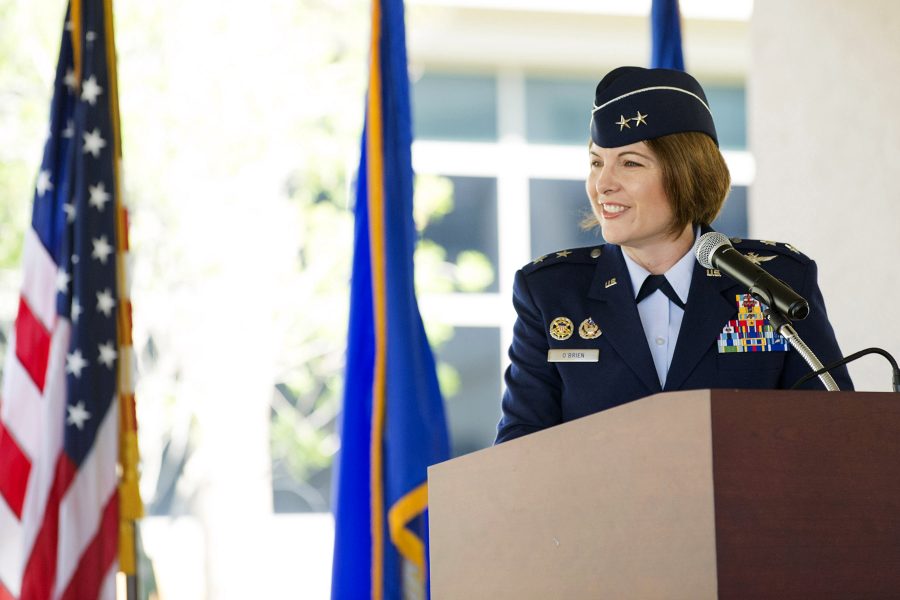The Air Force’s intelligence and cyber operations branch will soon roll out a diversity and inclusion strategy to strengthen its workforce and the quality of their analyses.
“Diversity, equity, inclusion are critical to our success going forward. It’s a national security imperative; it’s in the [Director of National Intelligence’s] principles for professional ethics,” Lt. Gen. Mary F. O’Brien, deputy chief of staff for intelligence, surveillance, reconnaissance, and cyber effects operations, said at a Feb. 2 event hosted by the Intelligence National Security Alliance.
O’Brien became the top officer in the information warfare portfolio—spanning surveillance drones, intelligence-analysis systems, cyber offense and defense, and more— in November 2019. She inherited a $72 billion enterprise that is trying to make the best use of its 73,000 employees for sifting through global information and separating the signal from the noise, while offloading some of that work to artificial intelligence algorithms.
O’Brien, who has served as a top general officer on the Air Force’s Women’s Initiative Team that pushes for gender equity in the service, said she’s channeling that experience into a new diversity and inclusion office focused on the ISR and cyber community. A colonel-select and a senior master sergeant manage that work and directly report to O’Brien.
At the top of that office’s to-do list is publishing a diversity and inclusion strategy this month to reshape efforts from recruitment to retention. The strategy aims to address the barriers that Airmen in certain demographic groups, from racial minorities to mothers, face as they scale the career ladder.
“Research shows that diverse teams are smarter,” O’Brien said. “They focus on the facts, they process the facts more carefully, they’re open to more innovative solutions, better return on investment, more efficient use of resources.”
In the intelligence field, diversity can help teams spot trends and threats they may not have thought to notice. Information can slip through the cracks if people lack the right insight to know what’s important and what’s not, proponents say.
The push comes as the Air Force has launched a broad effort to combat racism and discrimination in its ranks, and boosted diversity-minded recruitment initiatives like offering more scholarships to students in the Reserve Officer Training Corps at historically Black colleges and universities and Hispanic-serving institutions.
Diversity and inclusion training is becoming part of advanced coursework for intel Airmen at the Goodfellow Air Force Base, Texas, schoolhouse. O’Brien wants to see the same change for senior noncommissioned officers in the cyber field.
O’Brien is one of four uniformed women in top Air Force positions—a group that includes Chief Master Sergeant of the Air Force JoAnne S. Bass, Air Mobility Command boss Gen. Jacqueline D. Van Ovost, and Surgeon General Lt. Gen. Dorothy A. Hogg. As a female member of the Air Staff, O’Brien is in a unique position to advocate for women in her own area of expertise as well as across the force.
As part of the Air Force’s report to top-level Pentagon officials on its measures to prevent sexual assault and harassment, O’Brien said she’s drawing on lessons from “Know My Name: A Memoir,” Chanel Miller’s 2019 account of sexual assault and its aftermath while she was a student at Stanford University.
“It is a very powerful description of what it’s like for a sexual assault victim to seek justice, even if the assailants were caught in the act,” O’Brien said. “I highly recommend “Know My Name” for anyone, which in my mind, would be everyone who is addressing sexual assault or sexual harassment in the workforce.”
She’s also using her own experience to shape how the ISR and cyber enterprise addresses unconscious bias.
“The one that I’ve faced … most in my career, since I had my children, was the maternal bias,” O’Brien said.
People may think women are less committed to their careers if they decide to have children, while also seeing them as less dedicated parents for wanting to succeed at work. She noted the baked-in assumptions that cause “traditional” or ethnic stereotyping of minority Airmen as well.
“We’re also looking at creating a minority leader program, because I don’t want to just start at recruiting,” she said. “What about the demographics of the people that we have serving today? Otherwise, we’re always going to be 20 years away.”
The three-star feels empowered to pursue a more inclusive force under the leadership of Air Force Chief of Staff Gen. Charles Q. Brown Jr. and Defense Secretary Lloyd J. Austin III. They are, respectively, the first Black four-star to lead one of the U.S. armed forces, and the first Black civilian to run the Pentagon.
“I have the top cover and examples in the leaders like Gen. Brown and Secretary Austin,” O’Brien said. “They’ve made it very clear that diversity and inclusion is going to be a priority.”
“We’re perfectly postured to follow their lead and guidance in this area,” she said.
